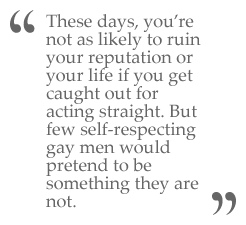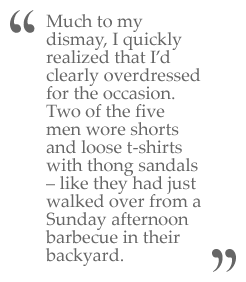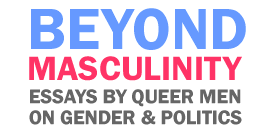|
 n
1895, Oscar Wilde was handed a calling card which read:
“To Oscar Wilde – posing as a somdomite.” It was
intended by its writer, Lord Queensberry, to be an
insult. But Queensberry didn’t just get the spelling
wrong; he also misunderstood the word’s meaning. If
Oscar Wilde was guilty of posing as anything, it was as
a straight man – not as a sodomite. Of course,
unbeknownst to the public, he was secretly leading a
very gay life. Unfortunately for Oscar, he wasn’t a
very good poser. He was eventually caught out and the
ensuing scandal ruined his reputation and his life. n
1895, Oscar Wilde was handed a calling card which read:
“To Oscar Wilde – posing as a somdomite.” It was
intended by its writer, Lord Queensberry, to be an
insult. But Queensberry didn’t just get the spelling
wrong; he also misunderstood the word’s meaning. If
Oscar Wilde was guilty of posing as anything, it was as
a straight man – not as a sodomite. Of course,
unbeknownst to the public, he was secretly leading a
very gay life. Unfortunately for Oscar, he wasn’t a
very good poser. He was eventually caught out and the
ensuing scandal ruined his reputation and his life.
 These
days, you’re not as likely to ruin your reputation or
your life if you get caught out for acting straight. But
few self-respecting gay men would pretend to be
something they are not. And I’ve never seen the logic in
pretending to be a card-carrying heterosexual,
especially when I’m happy and gay. But there was one
occasion when I faked being straight for a day. These
days, you’re not as likely to ruin your reputation or
your life if you get caught out for acting straight. But
few self-respecting gay men would pretend to be
something they are not. And I’ve never seen the logic in
pretending to be a card-carrying heterosexual,
especially when I’m happy and gay. But there was one
occasion when I faked being straight for a day.
The
occasion was a market research company looking for
straight (though they didn’t actually use the word) men,
between the ages of 30 and 40, who were married with a
child between the ages of 6 and12. While normally I
wouldn’t bother with such a masquerade, the incentive
was 30 dollars an hour. Hell, for that sort of money I’d
pretend to be lassie!
Better
yet, the topic of the market research was shopping. Now
this was one area of human experience I feel comfortable
classifying myself as an expert. Whether it was shopping
for clothes, books, DVDs or just having a coffee in a
cafe, I spent a significant amount of time in shopping
malls – they were like a second home to me. Ironically,
I was the ideal candidate for this study – except of
course that I happened to be in the wrong demographic.
Signing
up for the study was not a problem. After all, they
clearly had no litmus test to judge my heterosexuality
over the phone. No, the real challenge would be working
out how to ‘act straight’ once I arrived. I already knew
a few unspoken, straight-acting rules to help me out:
-
Don’t show strong emotion
-
Avoid “Chick flicks”
-
Don’t use your hands to make a point
-
Don’t cry
-
Don’t ever desire other men
There, of
course, are a few caveats to these rules. You can show
strong emotions if they’re ‘male’ emotions – like, for
instance, anger. You can also cry (quietly) while
mourning a death in the family or celebrating victory on
the sports field. Then you can grope, kiss, cuddle and
fondle all you like, but you have to follow the three
second rule: full body contact is permitted for up to 3
seconds. Any more than that, and you might be ‘gay.’
Observing
the “straight acting” rules in a straight environment
wouldn’t be a problem for me on a conscious level. But I
couldn’t speak for how my body would behave on an
unconscious level. Normally, I don’t check how my legs,
hands, eyes, mouth, or eyebrows behave every single
minute of the day. But now, expected to present as
heterosexual, I would have to control myself in ways in
which my body wasn’t accustomed. It would be like
wearing a straightjacket.
I
anticipated encountering at least one problem – I have a
natural tendency to gesture with my hands when making a
point. While straight men tend to let their voice speak
for themselves, many gay men (including myself) find it
useful to let our bodies reinforce our words. Of course,
I could always claim I was a fiery Italian or expressive
French man – if I only had a convincing accent up my
sleeve. Similarly – and equally troubling – I have a
natural tendency for my voice to go up slightly in pitch
when I get enthusiastic. I’d have to shoot for monotone
if I was going to convince anyone I was hetero.
On the
eve of my big debut, I realized I had yet another hurdle
to jump - a wardrobe problem, specifically. How exactly
do you dress straight? I did my best to avoid anything
stereotypically “gay” by selecting what I thought was
suitably masculine attire: a pair of sexy, three-quarter
length blue shorts with a matching tight, white T-shirt.
Observing my outfit in the mirror, it occurred to me
that straight men don’t wear anything tight unless it’s
designed to impress “chicks” at a social function. As
seeing as how there wouldn’t be any of said chicks at
this function, wearing something tight might be seen as
too “gay.” I ditched the tight look for something more
comfortable and conservative: a pair of beige linen
pants and a navy polo.
 Expecting
my outfit to blend in like camouflage, I marched into
the foyer of the hotel where the market research was
being held with my head held high and my face as free of
expression as possible. Much to my dismay, I quickly
realized that I’d clearly overdressed for the occasion.
Two of the five men wore shorts and loose t-shirts with
thong sandals – like they had just walked over from a
Sunday afternoon barbecue in their backyard. Another two
looked like they were ready to head down to a ranch in
their matching boots, beige moleskin jeans and plaid
shirts. Expecting
my outfit to blend in like camouflage, I marched into
the foyer of the hotel where the market research was
being held with my head held high and my face as free of
expression as possible. Much to my dismay, I quickly
realized that I’d clearly overdressed for the occasion.
Two of the five men wore shorts and loose t-shirts with
thong sandals – like they had just walked over from a
Sunday afternoon barbecue in their backyard. Another two
looked like they were ready to head down to a ranch in
their matching boots, beige moleskin jeans and plaid
shirts.
There
was, however one man who notably stood out from the
others. He wore a tight grey T-shirt with tight, blue
jeans – normally a gay uniform. I kept my eye on ‘Grey
Top’ for the rest of the afternoon to see if he would
give away any clues to his persuasion, so to speak.
While we
waited for the focus group to begin, I noticed that all
of the other men were practicing their best strong,
silent routine. None of them greeted or chatted amiably
with their neighbor. Normally, I would be outgoing and
chatty, but I followed their straight example and did my
best to act the part. Thankfully, this awkward and (to
me) unnatural silence was cut short when a female
moderator greeted us and invited us to join her in a
function room. We followed her into the other room,
where she offered us sandwiches and orange juice before
getting stuck into the research proper... (continue reading)
|




2 COMMENTS ON THIS ESSAY:
I am not gay (and perhaps greytop wasn't either), but I definitely relate to your experience here. I hate the straightjacket of straight male culture as well, and if you were able to reach most straight men on an emotional level, I'm sure most of them do too. I hate the uniforms (slacks/shirts, suits), I hate watching sports on TV, I hate speaking in a monotone manner, I hate it all!
It bothers me that you felt you had to act straight for this research. The reason it bothers me is that there is probably no gay male/lesbian demographic in their study, and as a result, they'll find that women love to shop and men hate to shop... with no oppossing viewpoint. In order to get a realistic idea of what men "want", they need gay men in the study... families or no families. The end result of a study without proper representation is an impoverished public arena for men, designed for the needs and desires of women only.
Our male minority, gay and straight, needs better representation. It's no wonder why our bathrooms are small, dank and lounge-less, our clothing dull and uniform, and our lives wittled down to leather chairs with cupholders positioned in front of the plasma TV.
I find your stereotyping of straight men this way is ridiculous. None of the men in my family or among my friends is anything like what you describe. As a bisexual man who can pass for whatever he feels like passing for, but doesn't bother, I find your unipolar and unsympathetic viewpoint to be a pale echo of what you must have suffered yourself. Perhaps you are writing out of a need for revenge, or to build yourself up where you have been put down, but either way, your attitude is simplistic and demeaning. My father, brother and nephews do not sit around watching sports and scratching their balls. You need to get over something.